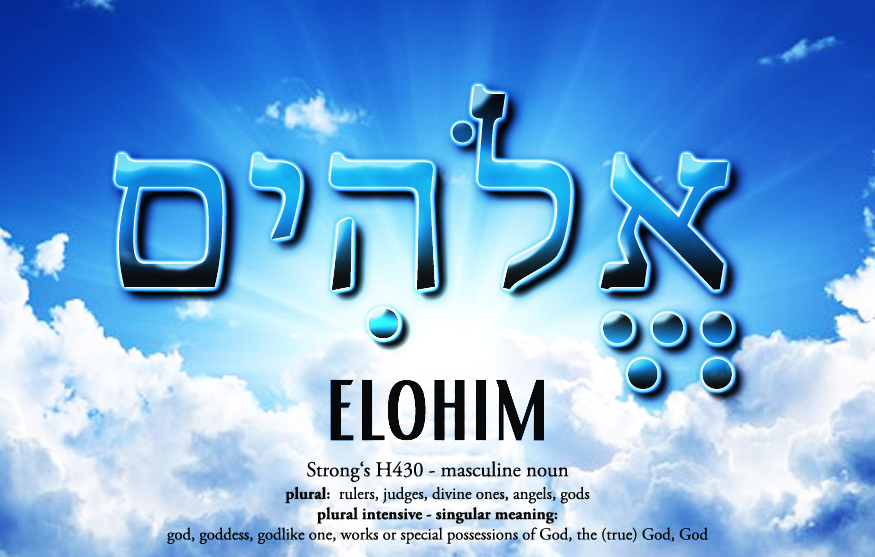|
Both the word of Yah and the divine name contain the power that called the universe into existence. |
Power of the Name
 The most powerful promise in Scripture is embedded in the divine name: Yahuwah. The eternally Self-Existent One calls Himself by a verb of being: Be.
The most powerful promise in Scripture is embedded in the divine name: Yahuwah. The eternally Self-Existent One calls Himself by a verb of being: Be.
And Moses said unto God, Behold, when I come unto the children of Israel, and shall say unto them, The God of your fathers hath sent me unto you; and they shall say to me, What is his name? what shall I say unto them?
And God said unto Moses, I Am That I Am: and he said, Thus shalt thou say unto the children of Israel, I Am hath sent me unto you. (Exodus 3:13-14, KJV)
“I Am” comes from the Hebrew, Hayah. “This verb means to exist, to be; to become, to come to pass, to be done, to happen, to be finished.”1 In other words, any verb of being can be the name of the Creator: am, is, are, was, were, be, being, been—they all apply equally to the Almighty.
When Yahuwah spoke the universe into existence, He did it speaking His own name and the breath He exhaled contained the power to do what the word said.
“Light, hayah!” (Genesis 1:3, Interlinear Bible) Light was.
“By the word of Yahuwah were the heavens made; and all the host of them by the breath of his mouth.” (Psalm 33:6, KJV)
Yah’s word contains the power to do what it says!
For as the rain cometh down, and the snow from heaven, and returneth not thither, but watereth the earth, and maketh it bring forth and bud, that it may give seed to the sower, and bread to the eater:
So shall my word be that goeth forth out of my mouth: it shall not return unto me void, but it shall accomplish that which I please, and it shall prosper in the thing whereto I sent it. (Isaiah 55:10-11, KJV)
Scripture repeatedly urges believers to call upon the name of Yahuwah precisely because the divine name contains divine power! When said in combination with your need, the divine name becomes the most powerful promise in the universe. It is a promise that whatever you need, divine love will supply.
The use (and misuse) of titles
Satan knows this. He has deliberately hidden the promise of the divine name by burying it under generic titles. For example, most modern translations quote 1 Chronicles 16:8 as saying: “Oh, give thanks to the Lord! Call upon His name; make known His deeds among the peoples!” But that’s not what it says at all! You cannot call upon a generic title. The original Hebrew actually says: “Oh, give thanks to Yahuwah! Call upon His name …”
Titles do not contain the power that is inherent to the divine name. This is precisely why, although the original Hebrew repeatedly mentions Yahuwah by name, most believers today know Him only as “God” or “the Lord.” They are unaware of the immense power and sheer beauty of the Father’s name.
Titles do have their place, however. They are useful when drawing a comparison between Yahuwah (the only true and living god) and all other false gods.2 For example, the first commandment states: “You shall have no other gods before Me.” (Exodus 20:3, NKJV) Paul, also, contrasted the one true god from all false gods, stating: “For even if there are so-called gods, whether in heaven or on earth (as there are many gods and many lords), yet for us there is one God, the Father, of whom are all things, and we for Him; and one Lord Yahushua Christ, through whom are all things, and through whom we live.” (1 Corinthians 8:5-6, NKJV)
Hebrew has generic titles, too. The titles that appear in Hebrew are el and eloah. They are the equivalent of the English word, “god.” In Scripture, besides referring to Yahuwah, these titles are also used to refer to the false gods Israel worshipped in times of apostasy. The plural form of el is elohim and it is here that a lot of confusion has arisen.
 Deuteronomy 6:4 declares there is only one god, and that is Yahuwah: “Hear, O Israel: Yahuwah our god [elohim], Yahuwah is one!”
Deuteronomy 6:4 declares there is only one god, and that is Yahuwah: “Hear, O Israel: Yahuwah our god [elohim], Yahuwah is one!”
Do you see the problem? “Elohim” is plural, but the text is saying He is one! And that is not the only passage that confuses people.
Throughout the Creation account, this plural form of the word appears repeatedly. “In the beginning, elohim [gods] created the heaven and the earth … and elohim [gods] said, Let there be light …” (Genesis 1:1 & 3, KJV)
This confusion has led even some non-trinitarians to assume that the Saviour is divine and eternally self-existent with the Father. This assumption, however, is incorrect. Careful study of Scripture proves that not only is the Saviour fully human, but he was not pre-existent, either. Therefore, there must be some other way to reconcile the apparently contradictory statements that Yahuwah our elohim [gods] is one.
And there is. The New Strong’s Expanded Dictionary of Bible Words says of “elohim”:
Gods in the ordinary sense; but spec[ifically] used (in the plur[al] …) of the supreme God; occasionally applied by way of deference to magistrates; and sometimes as a superlative.
In other words, using a plural form of the word to apply to a single personage was a common literary device in ancient Hebrew. It was used when the writer wanted to magnify the importance of the person being referenced. This is how the word frequently appears in Scripture. Yahuwah is the Most High. He is the Almighty. It was an attempt to communicate His importance and magnitude that led the writers of the Bible to refer to Him, using the plural elohim. It denoted His majesty and omnipotence on every level of infinite existence.
A plural title does not denote a plural deity and it certainly does not imply a reference to a divine Father/Son duo.

Call upon the name of Yahuwah
Believers are still urged to call upon the name of Yahuwah, “For whosoever shall call upon the name of Yahuwah shall be saved.” (Romans 10:13, KJV) While titles are useful to communicate concepts and ideas, they do not contain the power that the name of Yah has.
When the Saviour was to be born, Yahuwah sent an angel to Joseph in a dream, instructing him to give the child a specific name; a name which, itself, incorporated the divine name.
Behold, the angel of Yahuwah appeared unto him in a dream, saying, Joseph, thou son of David, fear not to take unto thee Mary thy wife: for that which is conceived in her is of the Holy Ghost.
And she shall bring forth a son, and thou shalt call his name Yahushua: for he shall save his people from their sins. (Matthew 1:20 and 21, KJV)
Yahushua means, literally, “Yahuwah’s salvation!” What a hope-inspiring name to give the Messiah! Full and complete salvation has been provided in the gift of Yah’s only begotten, fully human, son.
His name is not "Yahuwah-plus-my-efforts-saves" or "Yahuwah-with-my-help-saves". It is Yahuwah’s salvation; a complete gift.
Call on the name of Yahuwah. Salvation is yours already! There’s nothing more to be done. Yahuwah saves. And that is sufficient for all.
|
To learn more about the holy name, the proper and improper use of titles, and the meaning of “elohim” |
1 Lexical Aids to the Old Testament, the Key-Word Study Bible.
2 Due to the prevalence among Christians of substituting titles for the divine name, WLC does not capitalize any title even when referring to Yahuwah. “God” and “lord” are simply titles; they are not His name.
For more on this very important subject:
- Q&A
- Content Directory (Trinity)
- eBooks (In this non-WLC resource, you will find an explanation for all of the verses used to support the pre-incarnate Christ doctrine.)







